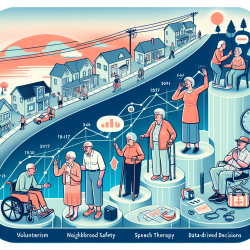Introduction
The study titled "The Increasing Prevalence of Children Home Alone in Ghana: The Importance of Considering Regional Inequalities" provides valuable insights into the growing issue of inadequate child supervision in Ghana. As practitioners focused on improving child outcomes, understanding these dynamics is crucial. This blog explores how the findings can be applied to enhance our practice and encourages further research.
Key Findings from the Research
The study reveals a significant increase in the prevalence of children left home alone in Ghana, rising by 8.5% between 2011 and 2018. This translates to over 500,000 more children being left unsupervised. The research highlights that regional disparities play a crucial role in this trend, suggesting that structural factors, rather than just individual or household characteristics, are significant contributors.
Implications for Practitioners
Understanding the regional differences in child supervision practices is essential for practitioners. Here are some actionable insights:
- Focus on Regional Contexts: Tailor interventions to the specific regional contexts. Recognize that cultural norms and socioeconomic conditions vary significantly across regions.
- Collaborate with Local Authorities: Work closely with local governments to address structural barriers to adequate child supervision, such as access to childcare facilities and economic support programs.
- Promote Awareness and Education: Educate communities about the risks associated with inadequate child supervision and the importance of early childhood education programs.
Encouraging Further Research
The study underscores the need for more in-depth research into the structural factors influencing child supervision. Practitioners can contribute by:
- Conducting Local Studies: Initiate studies that focus on specific regions to gather more granular data on child supervision practices.
- Exploring Cultural Influences: Investigate how cultural norms and practices impact child supervision and develop culturally sensitive interventions.
- Evaluating Policy Impact: Assess the effectiveness of existing policies and programs aimed at improving child supervision and suggest improvements.
Conclusion
By integrating the findings from this research into practice, practitioners can better address the challenges of inadequate child supervision in Ghana. Continued research and collaboration with local stakeholders are essential to create sustainable solutions.
To read the original research paper, please follow this link: The Increasing Prevalence of Children Home Alone in Ghana: The Importance of Considering Regional Inequalities.










